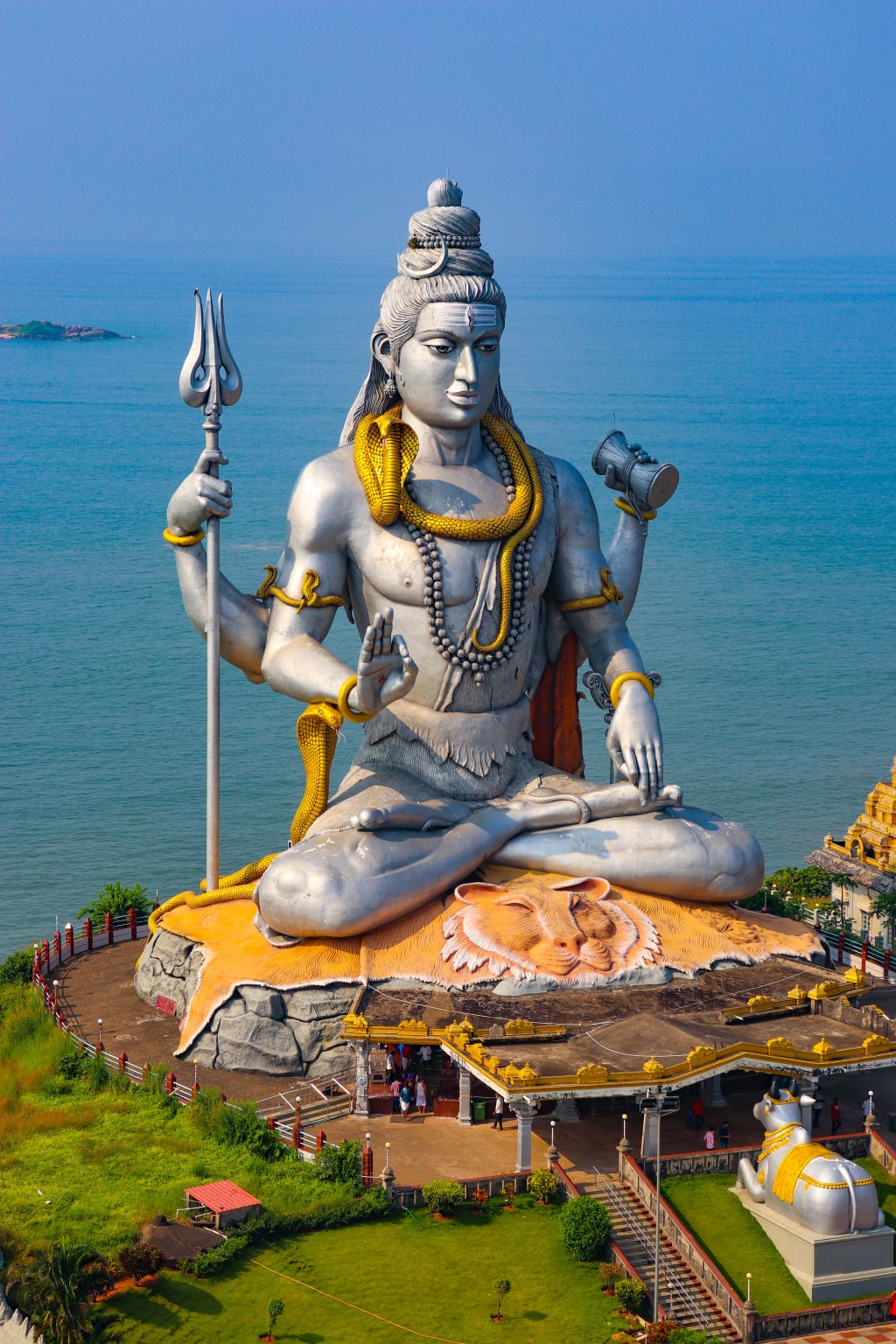Mahashivarathri
A Night of Devotion and Renewal

Long, long ago, in the land of ancient India, there lived a powerful demon named Tarakasura. He was incredibly strong and had been granted a boon by Lord Brahma that he could only be defeated by a son born to Lord Shiva.
Tarakasura knew this and was convinced that he could never be defeated, as Lord Shiva was a hermit who had taken up a life of meditation and had no interest in marriage or children.
However, as fate would have it, Lord Shiva fell in love with the beautiful Goddess Parvati, and the two were married. Soon after, Parvati became pregnant, and the entire universe was filled with anticipation for the birth of Lord Shiva's son.
Tarakasura was not happy about this turn of events and began to plot against Lord Shiva and his family. He sent his army of demons to attack them, but Lord Shiva, with his immense power, was able to defeat them all.
As the day of the birth of Lord Shiva's son approached, Tarakasura became more and more worried. He knew that if the child was born, his days would be numbered.
To prevent this from happening, he sent his most powerful demon, Taraka, to kill the child as soon as he was born.
However, Goddess Parvati had a plan of her own. She knew that the child would need protection, so she created a fierce goddess named Kali to guard him.
On the night of the birth, Kali stood guard outside the door of the birthing chamber, waiting for Taraka to arrive.
As soon as he appeared, Kali engaged him in a fierce battle. The battle raged on for hours, but eventually, Kali emerged victorious, killing Taraka with a single blow.
With the threat of Taraka gone, Lord Shiva's son was born, and the entire universe rejoiced.
The child was named Kartikeya and grew up to be a powerful warrior who defeated Tarakasura and restored peace to the land.
This event is celebrated every year on Mahashivarathri, a festival dedicated to Lord Shiva and his family. It is a time of great celebration and joy, as devotees offer prayers and perform rituals to seek the blessings of Lord Shiva.
The day before Mahashivarathri, devotees begin a fast, which is believed to purify the body and mind. On the day of the festival, they wake up early in the morning, take a bath, and visit the nearest Shiva temple to offer their prayers.
The most significant ritual of Mahashivarathri is the Abhishekam, or the ceremonial bathing of the Shiva Linga. Devotees pour milk, honey, and other offerings over the Linga, symbolizing the worship of Lord Shiva.
In some parts of India, Mahashivarathri is celebrated as the wedding anniversary of Lord Shiva and Goddess Parvati. Married couples perform special pujas to seek the blessings of the divine couple for a happy and prosperous married life.
Another significant aspect of Mahashivarathri is the performance of bhajans and kirtans, or devotional songs and chants. Devotees gather in large numbers to sing and dance in praise of Lord Shiva.
The festival of Mahashivarathri is a time of spiritual awakening and a reminder of the power and grace of Lord Shiva. It is a time to seek his blessings and guidance, and to rekindle our faith in the divine.
As the night of Mahashivarathri approaches, devotees light lamps and candles, creating a beautiful atmosphere of devotion and reverence. The air is filled with the fragrance of flowers and incense, and the sound of bells and drums adds to the festive atmosphere.
Many devotees also observe a night-long vigil on Mahashivarathri, spending the entire night in prayer and meditation. It is believed that Lord Shiva is most receptive to the prayers of his devotees during this auspicious night, and that their wishes will be fulfilled.
As the night wears on, the devotees become increasingly immersed in their prayers and meditations, forgetting the outside world and merging with the divine.
In some parts of India, Mahashivarathri is also celebrated with the performance of traditional dances such as the Isha Yoga at TamilNadu, Thiruvathirakali in Kerala and the Jagar in Uttarakhand. These dances are performed by women and are believed to invoke the blessings of Lord Shiva and his consort, Goddess Parvati.
In recent times, Mahashivarathri has also become a time for social and cultural events. Many cities organize cultural programs, musical concerts, and art exhibitions to celebrate the festival.
However, at its core, Mahashivarathri remains a deeply spiritual and devotional festival. It is a time to connect with the divine and to seek the blessings of Lord Shiva, the destroyer of evil and the embodiment of compassion.
As the dawn breaks on the day after Mahashivarathri, the devotees emerge from their night-long vigil, feeling renewed and re-energized. They carry with them the blessings of Lord Shiva and a renewed commitment to their spiritual path.
The festival of Mahashivarathri is a reminder of the power of faith and devotion, and the transformative power of spiritual practices. It is a time to transcend the limitations of the material world and to connect with the eternal and the divine.
As the devotees disperse, they carry with them the memories of a night filled with devotion, and the hope that their prayers and wishes will be fulfilled. They return to their daily lives with a renewed sense of purpose and a deeper understanding of the power of the divine.
Mahashivarathri is not just a festival; it is a reminder of the timeless wisdom of India's spiritual traditions and a celebration of the human spirit's capacity for transformation and transcendence.
About the Creator
Dinesh Ram
Meet Dinesh Ram, a content writer & digital designer passionate about researching food habits. Skilled in crafting engaging & informative content. Creating unique content that stands out in the online space.






Comments
There are no comments for this story
Be the first to respond and start the conversation.